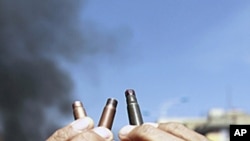Yemeni security forces have fired on tens of thousands of protesters demanding the ouster of President Ali Abdullah Saleh, killing at least nine and wounding dozens at rallies in at least three cities.
In the capital, Sana'a, government troops, snipers and plainclothes security forces fired tear gas and live ammunition on a large crowd marching to the Cabinet building. Medical sources say the violence killed six protesters and wounded dozens of others. They said the number of dead is likely to rise.
Wednesday's march was part of the demonstrators' plan to escalate their opposition movement by holding repeated protests in front of state institutions.
Meanwhile, Yemen's main industrial city, Taiz, remained under siege for a third day, with security forces trying to contain huge street gatherings. Witnesses say pro-government snipers killed at least two demonstrators. Reports say several people were wounded from gunfire, tear gas and beatings by Yemeni security forces.
Protests also took place in the Red Sea port city of Hudaida as well as Ibb, Damar and Aden, with at least one death reported.
In neighboring Saudi Arabia, representatives of six Gulf nations urged Yemen's government and opposition leaders to sign an agreement that calls for President Saleh's resignation. The Gulf Cooperation Council made the call Tuesday as it wrapped up a summit.
In a joint statement, council members said their agreement represents Yemen's "best way" out of its political crisis and would "spare the country further political division and deterioration of security."
The plan calls for Mr. Saleh to hand over power to a deputy and step down within 30 days of signing the accord. It also calls for the establishment of a unity government that includes the opposition.
Mr. Saleh has refused to sign the agreement in his capacity as president. He says he will only sign it as leader of the ruling General People's Congress party. He told supporters last week he will resist calls for his resignation until a solution is found that meets constitutional standards.
Some information for this report was provided by AP and Reuters.




